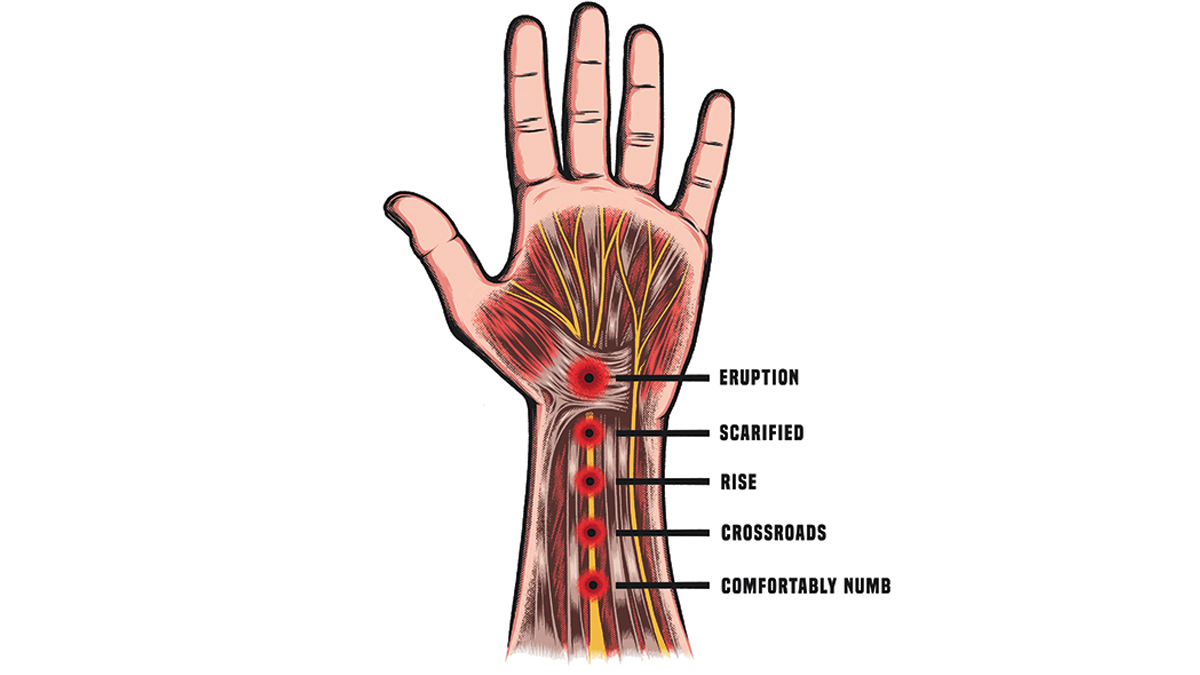Have you injured yourself playing guitar? New study reveals that musculoskeletal injuries are not related to bad technique – but sadly might be unavoidable
The research proves that shredding can make your wrists and shoulders go ouchie, but is there anything we can do to prevent injury?

If you’ve ever gotten wrist pain after spending hours perfecting the Stairway to Heaven solo, you can breathe a sigh of relief: you might be a boomer, but old age isn’t necessarily the cause.
In a recent study published in the scientific journal PLoS One, a team of researchers from Israel’s Tel Aviv University found that playing guitar can lead to developing musculoskeletal injuries. Or, in words that a bassist could understand: shredding can make your wrists and shoulders go ouchie.
For the study, the researchers had 25 guitar players, all of whom had been playing for at least five years and practiced for at least 20 hours a week, fill out a questionnaire about their guitar-playing habits. Every single one of the players had reported joint pain at least once in the previous year, with some having as many as 18 incidents of joint pain during that time. The players ranged in lifestyle – some were married, while others were single, some in shape and others less so.
They then had each of the players run through a popular Israeli rock song twice, and measured the angles of the shoulders, wrists and torso in standing and sitting positions.
What they found was likely unsurprising to many guitarists with a dedicated practice routine: standing and sitting, there was a correlation between the range of joint rotations and ensuing discomfort in those joints. They found that the injuries were most likely to occur in the back, wrists and strumming hand – and less so in the fretting-hand fingers.
“Mechanically, since the moment arms of our muscles are longer in big joints (like the back and wrist) compared to smaller ones (like the fingers), the overall moment of the contracting muscles is larger in these large joints,” researchers Navah Ratzon and Sigal Portnoy told us via email. “This induces higher joint reaction forces that may harm the joints. Also, the ligament complex of the fingers is tighter and more firm compared to that of the bigger joints.”
The bad news is that the injuries weren’t the result of bad technique: improving your tremolo picking will not, sadly, reduce your risk of wrist pain. Rather, the injuries are the result of repetitive motions and putting the body into an awkward position. Even worse – they found that the more years of playing someone had, the higher the amount of joint pain they tended to report.
Get The Pick Newsletter
All the latest guitar news, interviews, lessons, reviews, deals and more, direct to your inbox!
Keep yourself in shape, exercise regularly, play standing rather than sitting as much as possible and make sure to warm up before playing and maintain a comfortable posture
There is good news – the researchers have advice for guitarists to ensure that their “solo face” is a grimace of ecstasy rather than agony: keep yourself in shape, exercise regularly, play standing rather than sitting as much as possible and make sure to warm up before playing and maintain a comfortable posture.
As for who is most at risk – metalheads or classical players? – the researchers said they couldn’t say, as that was outside the purview of the study, although all the players involved were studied while playing on a nylon-string acoustic.
As the children of the thrash ’80s and grunge ’90s move into middle age, medical science has started taking note of the health effects that loud guitar music can have on the body. A warning to those who prefer punk to Paganini: in 2015, a doctor documented the first ever case of headbanging causing a subdural hematoma, a serious condition in which blood pools on the surface of the brain.
Adam is a freelance writer whose work has appeared, aside from Guitar World, in Rolling Stone, Playboy, Esquire and VICE. He spent many years in bands you've never heard of before deciding to leave behind the financial uncertainty of rock'n roll for the lucrative life of journalism. He still finds time to recreate his dreams of stardom in his pop-punk tribute band, Finding Emo.
“The Strat was about as ‘out’ as you could get. If you didn’t have a Floyd Rose, it was like, ‘what are you doing?’”: In the eye of the Superstrat hurricane, Yngwie Malmsteen held true to the original
“He got that from me. I used to throw my guitar as high as I could, like, 20 feet, and my guitar tech would catch it”: Dez Dickerson on Prince, his iconic Little Red Corvette solo, and why he left the Revolution










